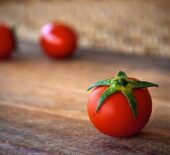The Mediterranean Diet is a champion of diets. The health benefits of a Mediterranean Diet are many and include reduced risk of type two diabetes, heart disease, metabolic disease Parkinson's and Alzheimer's diseases and cancer. So how do you jump on board this diet linked to so many health benefits? Follow these ten commandments:
Firstly it is important to distinguish that there are many different type of Mediterranean diets but the one linked to health is based off a traditional peasant style diet. The basic principles are:
Select A Heathy Fat
The main source of fat comes from olive oil. Extra virgin olive oil is the least processed form and highest in antioxidants and phytochemicals which protect your body. In addition to providing your body with heathy monounsaturated fat it also has over 36 different antioxidants. These fight off free radicals which can cause damage and disease to the cells of your body. Aim to include olive oil at around 60mL/day (10g is around 2 teaspoons)
Love Your Veggies!
Vegetables are included every meal with a daily goal of 400g. To put this into perspective a handful of leafy greens is about 75g or half a cup of cooked vegetables. Tomatoes count as a vegetable in this case and are suggested to be included as part of this diet.
Beans Are Your Friend
Beans or legumes are included at least twice a week with a serve being 250g. You can achieve this by adding red kidney beans instead of using meat in your pasta dish. Or simply enjoy the classic baked beans on toast more often.
Try using chickpeas in a salad or roasting your favourite beans and flavouring with herbs and spices. Beans are high in protein and fibre to keep you full as well as decrease your risk of cancers like colorectal cancer (the opposite effect to red and processed meat).
Enjoy Seafood
Fish or seafood is included twice a week in the Mediterranean Diet with a serve being 150g. You do not need to buy the most expensive fish here tuna in a tin is fine and can be more affordable for those on a budget. Seafood gives your body lots of the healthy polyunsaturated fats known as omega-3 fatty acids which have many benefits for your brain, skin and absorption of fat soluble vitamins A, D, E and K.
Moderate Red and White Meat
Aim to fill up on the legumes and fish meals first then fill the gaps with red meat or chicken. Preferably the leanest cuts with excess fat and skin removed to reduce the amount of saturated fat you eat. This type of fat is linked to heart disease as it increases your LDL cholesterol, clogging your arteries and can lead to a heart attack or stroke.
Whole Grains Are King!
Whole grains provide your body with a higher nutrition kick compared to the refined varieties. Whole grains include more fibre and vitamins and minerals like iron, zinc, phosphorous and magnesium to keep your body functioning optimally. Examples of ways you can increase your whole grains could selecting whole grains sourdough breads over the refined white, whole grain cous cous over refined or try brown, red or black rice instead of white.
Fruit Is Not Bad
Fruit as a whole is a beautiful composition of antioxidants, fibre and yes some sugar in the form of fructose. Try eating 2 larger whole fruit pieces like a banana, orange or pear or two smaller pieces like mandarins, plums or peaches as a serve every day. Be careful with dried fruit as it is energy dense, less filling and you do not get to enjoy as much for a serve e.g. 1.5 teaspoons of sultanas is a serve or 2 dried apricots. Try not to drink your fruit but if you must 125mls of 100% fruit juice is a serve.
Enjoy Yoghurt
Enjoy yoghurt every day on this diet. Yoghurt is high in calcium, iodine, vitamin D, B12, selenium and good sources of protein and carbohydrates. Some varieties also contain as probiotics which are essential for a healthy gut microbiome.
Nuts Are In!
30g or a small handful of any nuts variety you enjoy most is included and aim for the no added salt to keep your heart happy.
The Extras:
Wine in moderation and only with meals. Skip the salt, to flavor your meals and snacks use herbs and spices like garlic, basil, mint or rosemary. This will add taste without increasing your blood pressure. If you are wondering where the sweets are included in this diet they are allowed but only on occasion and a taste. To follow in lines with the current guidelines in Australia this would mean 600kJ or 143 calories at most twice a week.
Take Home Message:
Use these Ten Commandments to help build structure for a balanced diet. Remember the key to long term health is long term adherence to a diet and this diet may be the one to make you your healthiest version of you!
The extras:
This one I am not a huge fan of adding if you don’t drink at the moment I suggest don’t start. If you do drink, only in moderation and if following the guidelines this is 2 standard drinks at maximum a day for men and women with no more than 4 standard drinks on any one occasion. Having a few alcohol free days a week is always good to give your liver a break.








